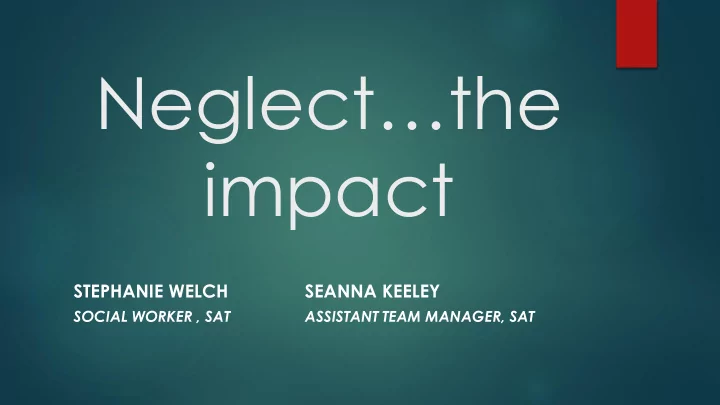

Neglect…the impact STEPHANIE WELCH SEANNA KEELEY SOCIAL WORKER , SAT ASSISTANT TEAM MANAGER, SAT
Aims of today To have a greater understanding of the social, behavioural and emotional signs of neglect To have a greater understanding of the social, behavioural and emotional impact of neglect To understand what effects neglect can have on brain development To understand the impact neglect can have on attachment and relationships
QUIZ
Neglect is the most common form of child abuse. How many children experience neglect? Source: Radford, L. et al (2011) Child abuse and neglect in the UK today.
Neglect is the most common reason for taking child protection action.
Police Health Warning signs Housing Education
Type of effect Infants 0-2 Early Childhood The School Years Development poor growth/ intellectual capacity short stature, dirty, unkempt severe educational deficits: learning disabilities, poor problem solving under stimulation delay in learning new skills poor reading, writing and maths nappy rash, infections, hospital learning slow and painful attendances language delay failure to thrive Behaviour withdrawn, lethargic, depressed lacking social skills disruptive/overactive in class self stimulating behaviour e.g. either aggressive or withdrawn desperate for attention rocking indiscriminate friendliness few friends overcompensation Emotional no learned trust shame and self doubt encopresis/eneuresis lack of confidence and expectation of guilt/self blame failure self harming poor self concept disturbed eating patterns
Effects of neglect on child development Chronic and severe forms of neglect can be fatal for a child. There also can be difficulties in forming attachments and relationships now and in the future Educational achievements are lower. Research states there is an increased risk of substance misuse Higher risks of experiencing abuse In later life difficulties in assuming parenting responsibilities. There are also poorer outcomes in both physical and mental health which can effect both in the short term and long term.
Effects on relationships and attachment Insecure attachment Poor attachment can significantly affect the relationships that people have throughout their lives. Attachment and mental health disorders transmission of relationship problems to significant others, for example, peers, teachers, substitute carers, professionals
Effects on brain development The first years of a child's life have a big impact on how their brain develops. That is why neglect can be so damaging – a child's experiences can change their thought processes and neural pathways. If a baby is malnourished, neural cells can become weak or damaged and this can cause lowered brain function. If a child has a poor relationship, attachment or little interaction with a parent then it can change how their brain develops emotional and verbal pathways. Neglect can severely alter the way a child's brain works. This can lead to an increased risk of depression in later life as well as dissociative disorders and memory impairments. Changes to the brain caused by neglect have also been linked to panic disorder, posttraumatic stress disorder (PTSD) and attention deficit and hyperactivity disorder (ADHD). (Child Welfare Information Gateway, 2009)
Why is it bad for children’s brains? lack of nutrients - reduced growth lack of stimulation – delayed brain development unregulated stimulation - disordered neural circuitry LSCB - By the age of 3 a baby’s brain has reached almost 80% of its adult size. The growth in each region of the brain largely depends on receiving stimulation. This stimulation provides the foundation for learning, research informs us that brain, development is ‘activity dependent’ ; every experience, excites some neural circuits and leaves others alone. Neural circuits used over and over are strengthened those that are not used are left weakened. Poor brain underdevelopment, can lead to difficulty regulating emotion, lack of cause effect thinking, inability to recognise emotions in others and lack of conscience. The development of a baby’s brain is affected by the attachment to their parents/carers; analysis of neglected children’s brains has shown that their brain growth is significantly reduced.
LD? health Early Developmental Predisposing factors genetics difficulties care Other The world I am…. people is…. are….
Case Study: Tom
Questions / Comments?
References: NSPCC - https://www.nspcc.org.uk/preventing-abuse/child-abuse- and- neglect/neglect/?utm_source=meganav&utm_medium=&utm_ca mpaign= LSCB neglect guide - http://southamptonlscb.co.uk/wp- content/uploads/2012/10/Neglect-Guide-Final.pdf Radford, L. et al (2011) Child abuse and neglect in the UK today. Child Welfare Information Gateway, 2009
Recommend
More recommend